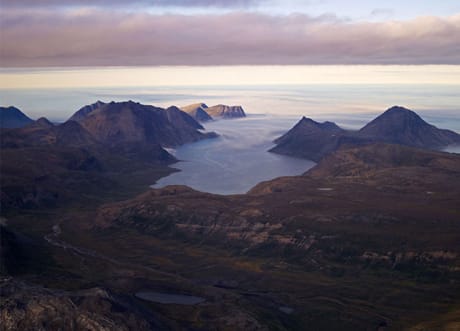In an effort to define and shape the national identity of Canada by interpreting the wilderness and expanses of open space as cultural signifier, The National Parks Project sent a filmmaker and a group of musicians to a park in each province or territory to capture their experience. Presumably, the freedom and rawness of nature as juxtaposed with primarily urban dwelling artists would inspire singularly Canadian works, noting the humbling, peaceful effect of home as prodigious, inspirational entity.
And even though what they captured was mostly painfully pretentious and uninspired twaddle, another similarly conceived project was funded wherein five Canadian writers would travel to the Torngat Mountains National Park in Northern Labrador to explore and create new works that would continue to shape our identity.
Hosted by CBC Radio's Shelagh Rogers, Northwords presents this experience with utmost superficiality and distancing politically apropos commentary. The documentary, or project, subjects, Noah Richler, Alissa York, Sarah Leavitt, Rabindranath Maharaj and Joseph Boyden are taken on a two-day journey to the remote park and thrust into broad orientation events involving local denizens and an abandoned Moravian missionary settlement.
With the sort of broad, prosaic commentary we've come to expect from commissioned Canadian content, this experience is narrated with glib graveness, mixing grandiose statements about the landscape with quotidian observations about bears lingering on the periphery of their camp. The writers themselves are limited to inspirational, optimistic sound bytes reinforcing the importance of the experience, which limits them to mere interchangeable ciphers scribbling down anecdotes about wildlife and the humbling experience of embracing a land free from affected pretence.
Only Richler is given an opportunity to say something that doesn't seem rehashed from a government funded pamphlet, pointing out that the missionary buildings are as horrific as they are impressive. Otherwise, this television-length documentary glosses over anything unseemly, focusing instead on canned dialogue and prescribed observations about the concept of home. There's even a mid-movie caribou slaughter that helps reiterate the vulgar cliché of it all.
Had this touchy-feely exercise in self congratulation touched on a little bit of humanity outside of its solipsistic hippie-dippy lexicon, it could have been intriguing, saying something about our identity in relation to the plight of human experience. But this project is far too preoccupied with its own significance and agenda to say anything fresh or even remotely challenging.
(FilmCan)And even though what they captured was mostly painfully pretentious and uninspired twaddle, another similarly conceived project was funded wherein five Canadian writers would travel to the Torngat Mountains National Park in Northern Labrador to explore and create new works that would continue to shape our identity.
Hosted by CBC Radio's Shelagh Rogers, Northwords presents this experience with utmost superficiality and distancing politically apropos commentary. The documentary, or project, subjects, Noah Richler, Alissa York, Sarah Leavitt, Rabindranath Maharaj and Joseph Boyden are taken on a two-day journey to the remote park and thrust into broad orientation events involving local denizens and an abandoned Moravian missionary settlement.
With the sort of broad, prosaic commentary we've come to expect from commissioned Canadian content, this experience is narrated with glib graveness, mixing grandiose statements about the landscape with quotidian observations about bears lingering on the periphery of their camp. The writers themselves are limited to inspirational, optimistic sound bytes reinforcing the importance of the experience, which limits them to mere interchangeable ciphers scribbling down anecdotes about wildlife and the humbling experience of embracing a land free from affected pretence.
Only Richler is given an opportunity to say something that doesn't seem rehashed from a government funded pamphlet, pointing out that the missionary buildings are as horrific as they are impressive. Otherwise, this television-length documentary glosses over anything unseemly, focusing instead on canned dialogue and prescribed observations about the concept of home. There's even a mid-movie caribou slaughter that helps reiterate the vulgar cliché of it all.
Had this touchy-feely exercise in self congratulation touched on a little bit of humanity outside of its solipsistic hippie-dippy lexicon, it could have been intriguing, saying something about our identity in relation to the plight of human experience. But this project is far too preoccupied with its own significance and agenda to say anything fresh or even remotely challenging.




